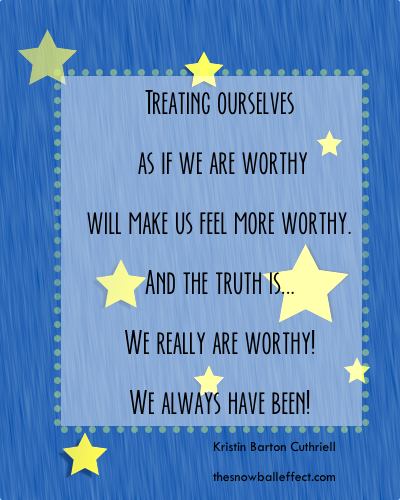 By Kristin Barton Cuthriell, MEd, MSW, LCSW
By Kristin Barton Cuthriell, MEd, MSW, LCSW
Success really does begin within.
(An excerpt from my recent article in the Huffington Post)
To illustrate just how important a strong sense of self-worth really is to our success, let’s take a look at the impacts of feeling unworthy. Some of this may really surprise you!
The Impact on Our Relationships
If we do not know our worth, our relationships will suffer. When we undervalue ourselves we usually operate with our insecurities in the driver’s seat, and we tend to communicate in a passive or aggressive way rather than communicating assertively. When a passive person feels threatened they want to retreat and avoid confrontation at all costs unlike the aggressive person who goes into fight mode. These defensive styles of relating are rooted in a low sense of self-worth.
People who know their value communicate assertively. They respect their own needs and the needs of others. Assertive folks communicate responsibly, effectively, and respectfully without giving their power away or trying to prove how powerful they are.
The Impact on Our Job Performance
When we devalue ourselves we will always sell ourselves short making it impossible to reach our true potential. If we don’t know our value, we won’t believe in ourselves which is necessary if we are going to be successful on the job. Opportunities will pass us by because we either assume the opportunity is out of our reach or we fear failure.
If we do not know our worth, we can be difficult to work with. We may take things too personally and become defensive- maybe even explosive. We may become passive aggressive, being outwardly compliant while taking sweet-toned vicious jabs at our co-workers.
We may even take on the role of office victim. You know the type that spends more time complaining about their job and their treatment than they do actually working. Philosopher Henri Frederic Amiel once said, “We are never more discontented with others than when we are discontented with ourselves.”
When we know our worth, we refuse to settle for the status quo and push ourselves out of our comfort zone. Knowing our worth decreases our fear of failure because we view mistakes as learning opportunities rather than something that defines us. Refusing to be victims, we spend less time complaining and more time trying to figure out how to change ourselves and our situation. It is clear to us that if we cannot change our situation, we have a choice to make. We can either accept the situation or find another place to work.
The Impact on Our Leadership
Leaders who do not know their worth on a deep level are usually not very effective leaders. This is often because they lack humility. Not knowing their worth causes them to overcompensate and come across as having an ego that is larger than life. This massive ego, which is actually covering up insecurity, makes them power driven and more likely to belittle and humiliate subordinates rather than inspire, encourage, and motivate.
Humble leaders, aka leaders who know their value, don’t have to prove their worth to anyone because they already know it. This makes them less egotistical, less threatened, less defensive, more approachable, and more encouraging to others.
They are team players. These leaders are excited to hear ideas from everyone no matter the person’s position or rank. They aren’t concerned with knowing it all and want to learn from others so that they can do what is right for their mission. Ezra Taft Benson noted, “Pride is concerned about who’s right. Humility is concerned about what’s right.”
Humble leaders do not belittle others to feel more powerful. To them leadership is not about having power over anybody. It is about empowering everyone they lead.
Read how to improve your sense of self-worth by following this link to my original Huffington Post article.
Lucille Ball once said, “Love yourself first and everything else falls in line.” Success really does begin within.
Leave a Reply